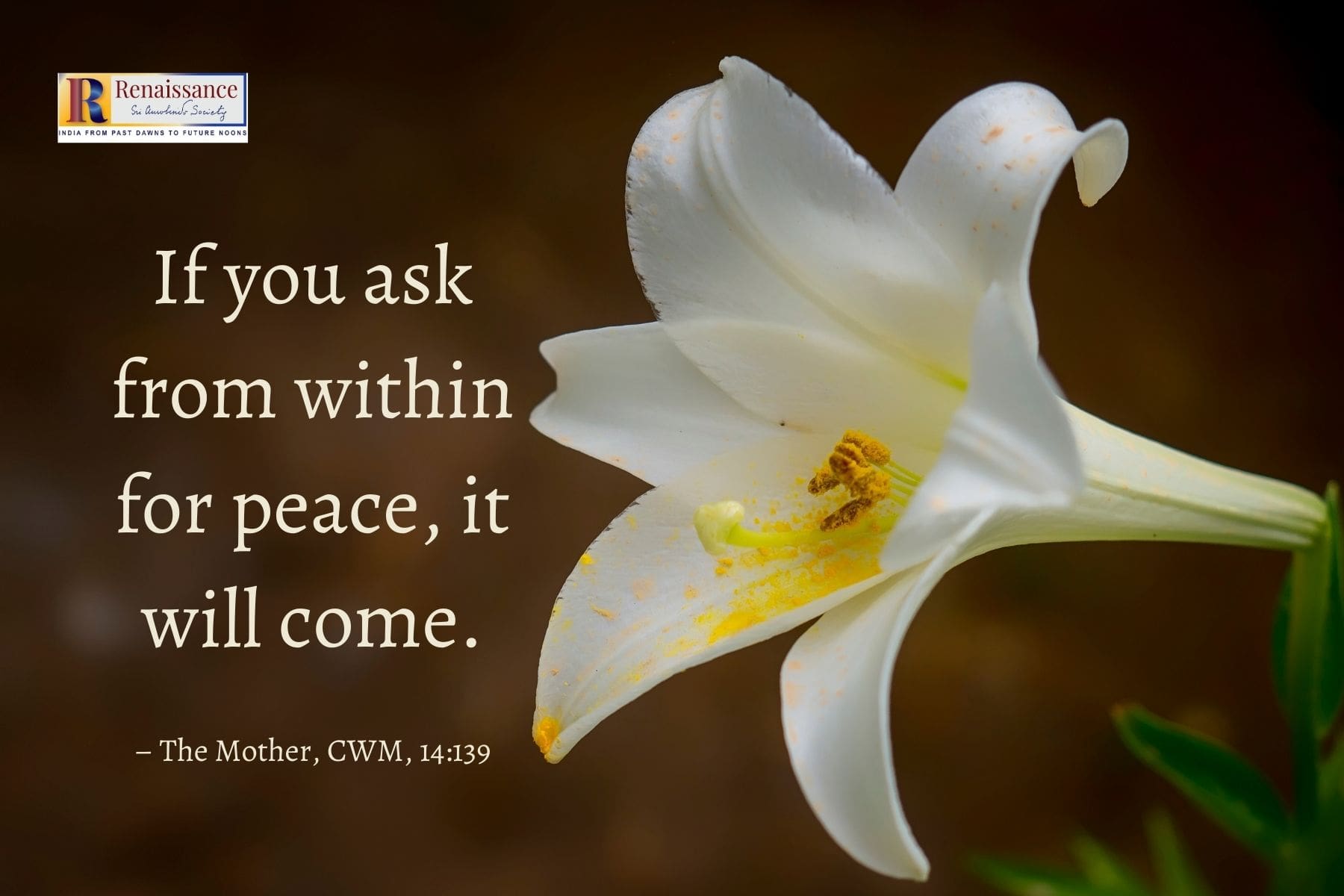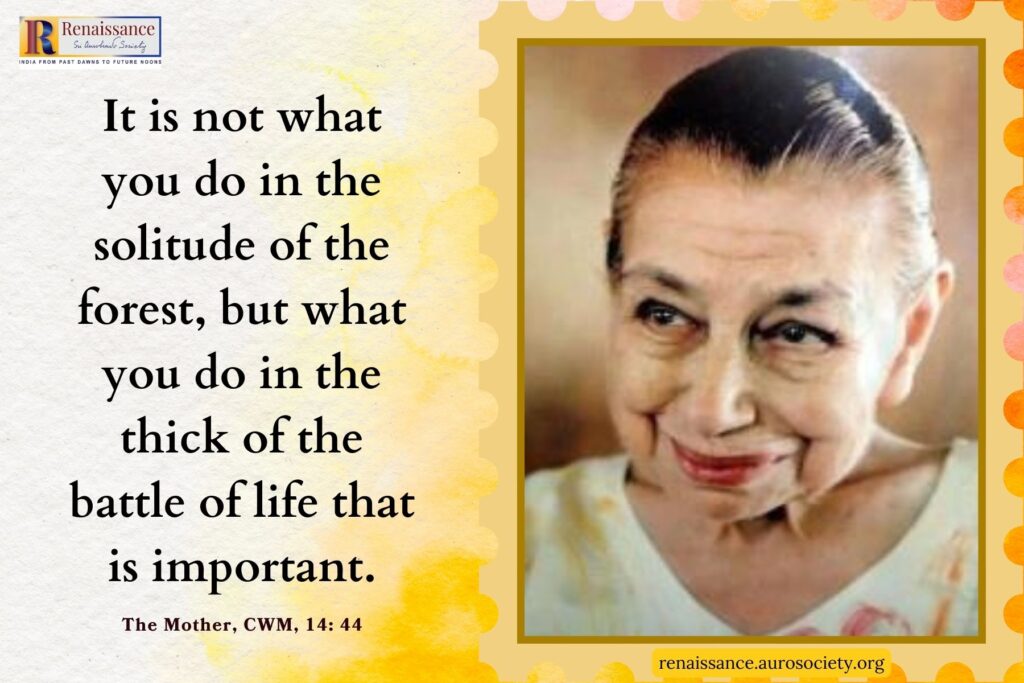Vol. III, Issue 7
Author: The Mother
Editor’s note: We feature two conversations of the Mother where she speaks of the significance of peace for a conscious sleep and how to establish a settled peace in mind. The editors have made a few formatting changes for this digital presentation, without making any alteration in the text.


Calling Peace as a Friend
Q: How can we establish a settled peace and silence in the mind?
The Mother: First of all, you must want it.
And then you must try and must persevere, continue trying.
[ . . .] You sit quietly, to begin with; and then, instead of thinking of fifty things, you begin saying to yourself, “Peace, peace, peace, peace, peace, calm, peace!” You imagine peace and calm. You aspire, ask that it may come: “Peace, peace, calm.” And then, when something comes and touches you and acts, say quietly, like this, “Peace, peace, peace.”
Do not look at the thoughts, do not listen to the thoughts, you understand. You must not pay attention to everything that comes. You know, when someone bothers you a great deal and you want to get rid of him, you don’t listen to him, do you? Good! You turn your head away (gesture) and think of something else. Well, you must do that: when thoughts come, you must not look at them, must not listen to them, must not pay any attention at all, you must behave as though they did not exist, you see!
And then, repeat all the time like a kind of—how shall I put it?—as an idiot does, who repeats the same thing always. Well, you must do the same thing; you must repeat, “Peace, peace, peace.” So you try this for a few minutes and then do what you have to do; and then, another time, you begin again; sit down again and then try.

Do this on getting up in the morning, do this in the evening when going to bed. You can do this. . . look, if you want to digest your food properly, you can do this for a few minutes before eating. You can’t imagine how much this helps your digestion! Before beginning to eat you sit quietly for a while and say, “Peace, peace, peace!” and everything becomes calm.
It seems as though all the noises were going far, far, far away (Mother stretches out her arms on both sides) and then you must continue; and there comes a time when you no longer need to sit down, and no matter what you are doing, no matter what you are saying, it is always “Peace, peace, peace.”
Everything remains here, like this, it does not enter (gesture in front of the forehead), it remains like this. And then one is always in a perfect peace. . . after some years.
But at the beginning, a very small beginning, two or three minutes, it is very simple. For something complicated you must make an effort, and when one makes an effort, one is not quiet. It is difficult to make an effort while remaining quiet. Very simple, very simple, you must be very simple in these things. It is as though you were learning how to call a friend: by dint of being called he comes.
Well, make peace and calm your friends and call them: “Come, peace, peace, peace, peace, come!”
~ 8 September, 1954, CWM, Vol. 6, pp. 313-314

Peace and Sleep
Q: Mother, what does this mean: “sleep has to be gradually transformed into the yogic repose”?
The Mother: Ah, yogic repose. It means that instead of an unconscious sleep it is a sleep—if you want to call it sleep—a conscious sleep.
The body is in a state of complete repose, with the nerves relaxed, the muscles relaxed; one is completely relaxed and at rest; but the spirit remains conscious, conscious enough to be able to put the vital also at rest, the mind also at rest, and let everything be in a state of peace, quietude, immobility, so that the consciousness may be completely free.
Then the consciousness can either rest also, if it thinks it necessary, or work if it thinks that is needed; and in any case it is free to do as it wants, what it wants, and to go to the regions to which it wants to go.
But the parts belonging to the present physical being, that is, the mind, vital and physical, are in a complete repose and a kind of immobility, due to which the hours of sleep do not need to be so long. One can cut short the number of hours of sleep very much if one leaves the body in this state of rest.
But this asks for much work, and a very conscious work, you see, very conscious and very persistent. It cannot be had immediately, it may require years of discipline. Only, once it is acquired, well, one has mastered sleep and can prevent, well. . .
For example, there are many people who, when they go to sleep, are in a very good state of consciousness, and when they wake up in the morning they are completely dazed and have lost all that they had gained the previous day; and that’s because their sleep is unconscious and they go out in the vital or the mind or the subtle physical; they go to undesirable places or else fall into the inconscience and lose in this inconscience all they had gained before. . .
It is something very necessary, but it can’t be acquired very easily. It is one of the most difficult things to do, but it is very useful; only, one can hardly do it without a very close guidance, because unless one knows how to do it even to the last detail, one risks doing stupid things.
In any case one thing you can do in all security is, before going to sleep, to concentrate, relax all tension in the physical being, try. . . that is, in the body try so that the body lies like a soft rag on the bed, that it is no longer something with twitchings and cramps; to relax it completely as though it were a kind of thing like a rag.
And then, the vital: to calm it, calm it as much as you can, make it as quiet, as peaceful as possible.
And then the mind also—the mind, try to keep it like that, without any activity. You must put upon the brain the force of great peace, great quietude, of silence if possible, and not follow ideas actively, not make any effort, nothing, nothing; you must relax all movement there too, but relax it in a kind of silence and quietude as great as possible.

Once you have done all this, you may add either a prayer or an aspiration in accordance with your nature, to ask for the consciousness and peace and to be protected against all the adverse forces throughout the sleep, to be in a concentration of quiet aspiration and in the protection; ask the Grace to watch over your sleep; and then go to sleep.
This is to sleep in the best possible conditions. What happens afterwards depends on your inner impulses, but if you do this persistently, night after night, night after night, after some time it will have its effect.
Usually, you see, one lies down on the bed and tries to sleep as quickly as possible, and then, that’s all, with a state of total ignorance of how it ought to be done. But what I have just told you, if you do that regularly it will have an effect.
In any case, it can very well avoid the attacks which occur at night: one has gone to bed very nicely, one wakes up ill; this is something absolutely disastrous, it means that during the night one has been getting infected somewhere in a state of total inconscience.
~ 2 March, 1955, CWM, Vol. 7, pp. 65-66

~ Design: Biswajita Mohapatra and Beloo Mehra



